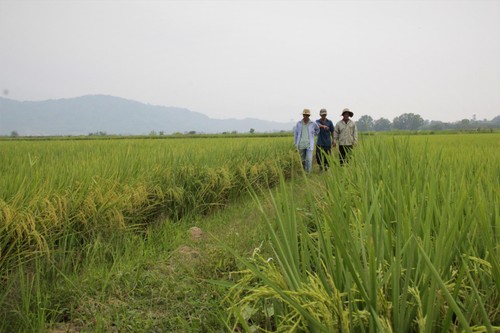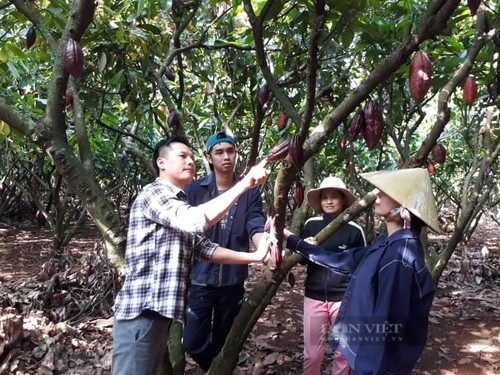 Members of Thang Binh Agricultural General Service Cooperative are checking the rice fields grown in line with VietGAP standards prior to the harvest. (Photo: baodaklak.vn) Members of Thang Binh Agricultural General Service Cooperative are checking the rice fields grown in line with VietGAP standards prior to the harvest. (Photo: baodaklak.vn) |
"Thang Binh HTB safe rice", a product of the Thang Binh Agricultural General Service Cooperative in Krong Bong district, has been favored by consumers recently. In 2020, the rice was recognized as meeting the provincial standards for 4-star OCOP items.
Early this year, Thang Binh Cooperative signed an order to export 6 tons of safe rice to New Zealand. It has set up 26 agents to sell the branded rice in 12 provinces and cities nationwide.
Vo Van Son, the Cooperative’s Director, attributed this success to the link between production, processing, and sales.
He recalled, “In the past, linkage was just to solve production problems. After that, farmers wanted to solve sales and marketing problems. Farmers used to know only about production. Now, if they want to bring their products to market, they have to understand marketing. The Cooperative can help the farmers do that."
Boosting links in production and sales to create safe food supply chains is a must for businesses which have led in supplying agricultural products to the market toward a sustainable agricultural production with high added value.
When participating in the chain, Damaca Nguyen Phuong Company in Krong Nang district, for example, has pledged that farmers can sell their products at stable prices with low risks and receive the company’s investment in seeds and agricultural materials for production.
Damaca can also secure product supply sources and product quality management, said Nguyen Thi Thu Phuong, the company’s Director.
“If farmers do it by themselves, they cannot produce products of uniform quality. Therefore, businesses need to work with them to create the best products by harvesting at the right time, for example. It’s not just the farmers who need to know how to take care of trees. Businesses and local governments need to support the farmers to achieve the best results,” said Phuong.
Dak Lak still has few small-scale agricultural processing chains. Due to low investment in the processing industry, the value of agricultural products hasn’t been improved by the chains. And some enterprises and cooperatives have an unstable output, which makes it difficult to expand the chains.
Cocoa is a case in point. Dak Lak has a raw material area of 1,200 hectares but only about 200 households participate in links with cooperatives.
 Truong Ngoc Quang (the man in checkered shirt on the left) is instructing farmers how to plant cocoa trees. (Photo credit to Truong Ngoc Quang) Truong Ngoc Quang (the man in checkered shirt on the left) is instructing farmers how to plant cocoa trees. (Photo credit to Truong Ngoc Quang) |
Truong Ngoc Quang, Director of the Nam Truong Son Cocoa Company, says this has limited the supply of quality goods to the market, adding, “A more inclusive policy is needed to develop the current 1,200-hectare area of raw materials in Dak Lak.”
Quang also called for greater support to help farmers and cooperatives understand that linking is urgent and necessary to build value chains toward sustainable production.
According to Nguyen Hoai Duong, Director of the provincial Department of Agriculture and Rural Development, Dak Lak has been implementing Government decrees on developing cooperation in agricultural production and consumption with a focus on post-investment support for pre-processing, processing, branding, and origin tracing.
“We’ll increase communications and create optimal conditions for localities in the province,” said Duong, adding, “In regions with lots of potential for producing specialties, linking for product sales is very important in developing product value chains. We have asked the provincial People's Committee to approve a project that will connect product sales in localities and regions across Vietnam.”
Dak Lak has more than 380 agricultural cooperatives and 90 import-export businesses. Its agricultural products are sold in 68 countries and territories around the world, including the US, Japan, UK, and France.
Once Dak Lak can make full use of value chains, it will improve product quality, increase added value, and make agriculture more sustainable despite market fluctuations.